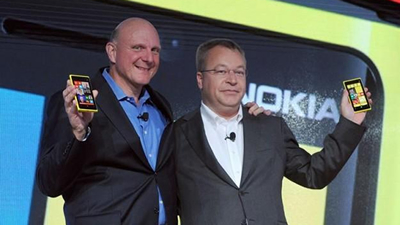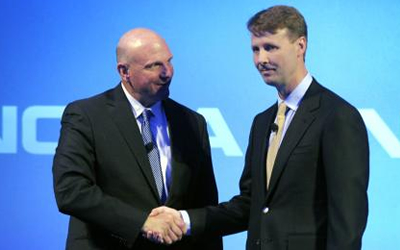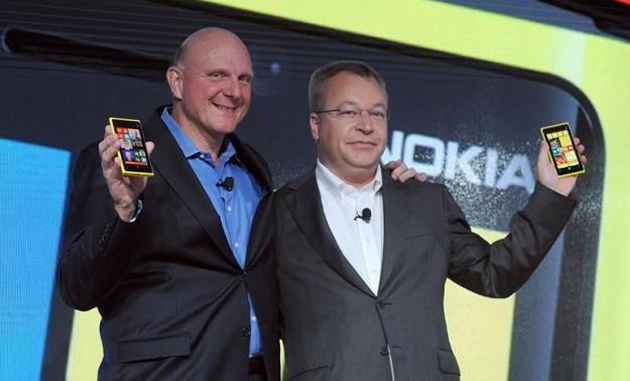Forget about the new smartphones and smart watches announced this week. The Really Big News is Microsoft’s announcement to buy Nokia’s Devices & Services business — including the Lumia brand and products — for a cool EUR 3.79 billion ($5 billion). Redmond will also license Nokia’s patents, and license and use Nokia’s mapping services, for an additional EUR 1.65 billion ($2.17 billion).
 The decision to sell was not easy, but the only practical option, the Finnish company said.
The decision to sell was not easy, but the only practical option, the Finnish company said.
“We need more combined muscle to truly break through with consumers,” said Nokia’s Stephen Elop in a press conference in Espoo, Finland, home of Nokia’s headquarters. “I share the frustration that comes from being so far behind two very large competitors [Apple and Google Android],” he said, but added that “our goal of becoming the third ecosystem is becoming real.”
Elop came to Nokia from Microsoft three years ago, but announced that he’s stepping down as CEO to become executive vice president of the devices and services business. He’ll return to Microsoft once the deal closes in the first quarter of 2014, following approval by Nokia shareholders. Elop will be joined at Microsoft by Nokia’s Jo Harlow, Juha Putkiranta, Timo Toikkanen, and Chris Weber, among others.

Steve Ballmer & Nokia interim CEO Risto Siilasmaa
Nokia’s interim CEO is now Risto Siilasmaa, who is Chairman of the Nokia Board of Directors. Siilasmaa said that following the sale to Microsoft, Nokia will focus on its three established businesses: NSN, which offers network infrastructure and services; HERE, which provides mapping and location services; and Advanced Technologies, which focuses on technology development and licensing.
About 32,000 Nokia employees are expected to transfer to Microsoft, including 4,700 people in Finland and 18,300 employees directly involved in manufacturing, assembly and packaging of products. The operations that are planned to be transferred earned Nokia an estimated EUR 14.9 billion — or almost 50 percent of its 2012 net sales.
Microsoft will also take over Nokia’s long-term patent licensing agreement with Qualcomm, as well as other licensing agreements. Nokia will retain its patent portfolio, but will grant Microsoft a 10-year license, while Microsoft will grant Nokia reciprocal rights to use Microsoft patents in its HERE services.
“We are excited and honored to be bringing Nokia’s incredible people, technologies and assets into our Microsoft family,” said Microsoft CEO Steve Ballmer in the official announcement. “Given our long partnership with Nokia and the many key Nokia leaders that are joining Microsoft, we anticipate a smooth transition and great execution.”
Ballmer also said this week that Nokia’s Elop is one of the candidates to succeed him as Microsoft CEO. Ballmer announced his resignation to Microsoft employees last week — a move that surprised even Ballmer’s critics, who thought that he’d likely linger a little longer.
Microsoft yesterday also announced that it’s chosen Finland as the home for a new data center in Europe. The company says it will invest more than a quarter-billion dollars in capital and operation of the new data center over the next few years, with the potential for further expansion in the future.
Although the Microsoft-Nokia deal is huge news for the mobile industry, it’s not entirely unexpected. Some pundits have been predicting a possible buyout ever since Microsoft’s Elop moved to Nokia three years ago, and then the companies partnered to transition Nokia from Symbian to Windows Phone.
But that partnership has had many critics, many of whom say that the perceived lack of apps and developer support was killing both companies’ chances of success. Even two years later, Windows Phone has taken just 3.9% of the global smartphone market — although the platform recently overtook BlackBerry for third place globally, and IDC predicted this week that it will climb to over 10% market share by 2017, and Microsoft says it wants to reach 15% by 2018.
Now, critics are saying that Microsoft should have killed off Windows Phone, and are predicting that the company will likely lose more value than it will gain from the Nokia acquisition. Those critics may have a point: Microsoft already lost $18 billion in market value in just two days since the deal was announced, according to Bloomberg.
However, there are some who are cheering for Windows Phone to succeed in a marketplace that’s now overwhelmingly dominated by Android devices and iPhones. Even Marc Andreesen — whose pioneering Netscape browser eventually lost out to Microsoft’s Internet Explorer — says he is rooting for Microsoft to give the mobile arena some much-needed competition and increased innovation.
For your entertainment, we’ve rounded up some of the best (or worst; you be the judge) cheers and jeers at the Microsoft-Nokia acquisition below. First, the cheers:
“Nokia Unlocks Significant Value With Microsoft Deal” — Forbes, Sept. 5:
“The net positive impact on Nokia’s valuation could add up to about $6.7 billion, or $1.80 per share. The upside to this depends on how effectively Nokia is able to monetize its patent portfolio now that it will not have a handset division to worry about while suing others.”
“My First Nine Questions About Microsoft’s Nokia Acquisition” — Time, Sept. 3:
“Microsoft has plenty of cash, and the cash it’s paying Nokia consists of overseas profits it wouldn’t otherwise bring home to the U.S. for tax reasons. Windows Phone is currently a struggling number three; if it ends up a healthy, competitive number three, Microsoft might be happy it spent the money. …If the deal ends up looking even modestly successful, it’ll have beaten the historic odds.”
“Marc Andreessen is rooting for Microsoft, thinks you should too” — CNET, Sept. 5:
“With Google and Apple as the only commanding forces in the mobile operating space, the industry needs Microsoft to succeed to keep competition alive, [Marc Andreessen] reasons. With Apple and Google’s application marketplaces housing an ocean of apps, there’s a small-fish, big-pond problem. ‘Microsoft will put substantial support behind developers because they need them.'”
“Will Microsoft’s Nokia Deal Shake Up Mobile?” — NPR, Sept. 3:
“For consumers, it’s probably a good thing. By buying Nokia, Microsoft is ensuring that there are going to be three viable choices in the market for smartphones instead of just two, with Google’s Android and Apple’s iPhone.”
“Nokiasoft comes full circle: Microsoft’s play for ultimate control will redefine the Windows ecosystem” — Engadget, Sept. 3:
“Microsoft now has the power to dictate its mobile fate by using Nokia to put a productivity-focused workhorse in there… just in time to capture a “whole generation of users” who aren’t even expecting it.”
And now, the (many) jeers:
“Microsoft Out $18 Billion on Ballmer Nokia Deal: Real M&A” — Bloomberg, Sept. 5:
“The world’s largest software company lost $18 billion in market value since the purchase of Nokia’s mobile-phone assets was disclosed, erasing all of the gains that followed the announcement last month that Ballmer is retiring, according to data compiled by Bloomberg.”
“Why I think the $7.2 billion Microsoft-Nokia deal is a terrible idea” — GigaOM, Sept. 3:
“Although Microsoft is still printing money and can afford a multi-billion dollar gamble, what if this doesn’t work out? Can it afford to fritter away a few more years on chasing shadows? There is nothing in the deal than inspires confidence that it will turn two also-rans into champions.”
“The Microsoft-Nokia deal: Fail plus fail equals more fail” — PC World, Sept. 3:
“Microsoft’s strategy pays no respects to a very stark reality: Very few people currently love Windows Phone, and doubling down on the platform via a Nokia acquisition may be throwing good money after bad.”
The Microsoft-Nokia Deal: Risks and Messiness” — The New York Times, Sept. 3:
“If you were only at 3 percent before, despite putting your best and brightest engineers together with Nokia’s, then paying $7 billion for Nokia won’t change anything. This is a goofball purchase that will have absolutely zero impact on Windows Phone’s fortunes in the world — except perhaps to sink them entirely.”
“Let’s get real: Nobody will license Windows Phone or Windows RT now” — GigaOM, Sept. 3:
“This news is just the final nail in the coffin for hardware makers to license Windows Phone, and Windows RT, for that matter.”
“The Deal that Makes No Sense” — Stratechery, Sept. 2:
“The war is over, and iOS and Android won. It would be far better for Microsoft to focus on serving and co-opting those devices, instead of shooting the most promising parts of their business in the foot for the sake of a platform that is never going to make it.”





